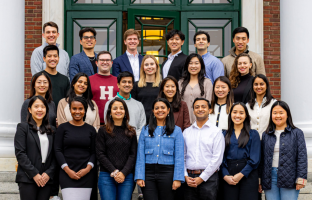HBS Career & Professional Development (CPD) is sharing Working Knowledge articles to further educate our recruiting partners about best practices in human resources.
This is not your parents' workplace anymore, Joseph Fuller reminds us. Crucial for attracting millennial workers are flexible work arrangements, meaningful mentorship programs, and sense of mission.
General Electric isn’t moving to Boston’s waterfront for the views, however breathtaking they may be.
In the increasingly fierce battle for millennial talent, GE’s decision to uproot its long-time headquarters from suburban Connecticut is nothing less than a capitulation to an emerging business reality. For GE, leafy Stamford was simply too hard a sell to make to increasingly urban millennials, who not only prefer to live in cities like Boston, San Francisco, and New York, but are willing to make employment decisions based on location. So GE is moving the mountain to Mohammed.
There are a number of key aspects of the old deal offered by companies that simply aren’t as compelling to the rising generation born after 1981 as they were to their boomer parents: full-time work in a traditional office environment, gradual advancement, a retirement plan and other benefits, along with life in a picturesque suburb.
Instead, global workplace surveys portray a generation that yearns for more flexible work arrangements and prioritizes work-life balance over career progression. Millennials want to advance quickly and are keenly interested in professional development, but they are also less loyal in the traditional sense, ready to jump ship when their employers fail to meet expectations.
Yet too many companies are falling short in their efforts to recruit the best and brightest young minds. Most try to convince skeptical millennials of the merits of their company; others pay lip service to their concerns by making superficial policy changes. Companies struggling to recruit millennials should consider GE’s example of bold action and completely rethink the packages they are offering to attract young talent.
Certainly an urban location is a magnet for the young and upwardly mobile. But as crucial, if not more so, are the flexible work arrangements, meaningful mentorship programs, and sense of mission that millennials crave.
"COMPANIES STRUGGLING TO RECRUIT MILLENNIALS SHOULD CONSIDER GE’S EXAMPLE OF BOLD ACTION AND COMPLETELY RETHINK THE PACKAGES THEY ARE OFFERING TO ATTRACT YOUNG TALENT."
For starters, companies would be smart to revisit how they structure work, especially when it comes to jobs in areas where competition for talent is especially fierce, such as coding, analytics, and life sciences. Survey after survey has found millennials prefer flexible work schedules, with the opportunity to work from home on more than just an occasional basis. These preferences have helped fuel the rise of the “gig economy” and the rapid growth of companies like HourlyNerd, which plays matchmaker between companies seeking affordable consultants and millennial MBAs looking for looser, more accommodating working relationships.
Rather than fighting the “gig economy,” companies should embrace it. That might mean bringing in some promising part-time employees to take hard-to-fill positions rather than flounder about trying to cajole dubious millennials with a presentation on the merits of corporate life. Such relationships could also allow companies to build institutional and personal connections that might later blossom into a more traditional employment arrangement. Since millennials list professional development as one of their top priorities, companies should also take a hard look at their mentorship programs, a widely embraced concept that now too often degenerates into pro forma and intermittent “check-in” lunches.
More important, companies must offer clear pathways to real responsibility. The kidney dialysis and medical services firm Davita Health Care Partners is one company that has embraced such an approach. Because it takes mentorship seriously, the firm reaps the rewards of a constant pipeline of fresh talent. Each year, DaVita visits college and business school campuses recruiting for its fast-track leadership program. Among other options, the program offers newly minted MBAs the opportunity to oversee a $50 million unit as a field operations director responsible for finance, strategy, and marketing.
Yet all the mentoring and flexible schedules won’t matter if a company is missing one of the most crucial pieces for attracting millennials. It must have a clearly articulated mission that includes a higher purpose than simply maximizing profitability. An overwhelming number of millennials in a recent Deloitte survey--almost nine out of ten—insisted that a business “should be measured by something more than just its financial success.” So if a company’s dominant message is that it revolves solely around its financial performance, that organization may wow stock analysts but lose the talent war.
With boomers retiring and Gen Xers aging, millennials are now the largest portion of the workforce and already starting to rewrite the rules. Companies must learn to play by those rules or risk losing out. Gradual changes to the old human resources playbook are no longer sufficient.
This post was originally published on HBS Working Knowledge.






.png&w=80&h=80)
